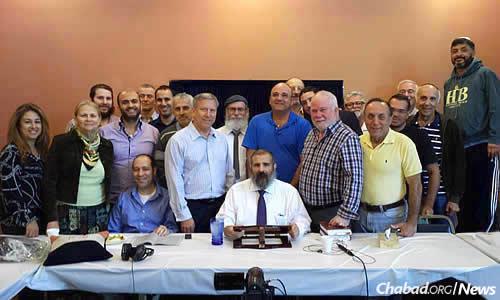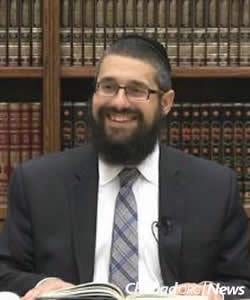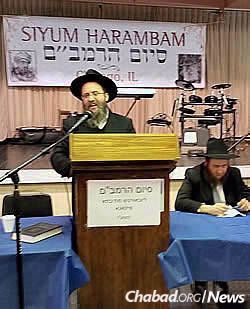Hundreds of thousands of people around the world will finish learning the Mishneh Torah today—Maimonides’ magnum opus, a compendium of all the laws of the Torah. Learning three chapters a day, it took these dedicated learners the better part of the past year to study the 1,000-chapter monograph.
To celebrate their efforts and to honor the wisdom of the 13th-century scholar and philosopher Rabbi Moshe ben Maimon (also known as “the Rambam” or “Maimonides”), Jewish communities worldwide will hold large Siyum HaRambam (the completion of the Rambam’s Mishneh Torah) events during the coming weeks.
Significantly, many will participate in the “Global Online Siyum HaRambam,” which will be broadcast live by Jewish.tv—the multimedia portal of Chabad.org, the largest repository of Jewish content online—beginning at 8 p.m. Eastern Standard Time.
Emphasizing the worldwide nature of the study cycle, the online gathering will feature speakers from all over the world.
Participants will be welcomed by Rabbi Moshe Steiner, director of Uptown Chabad-Lubavitch in Toronto, Canada, who’ll introduce Rabbi Zalman Mendelsohn, director of Chabad-Lubavitch of Wyoming; and Rabbi Yosef Chaim Kantor, chief rabbi and director of Chabad-Lubavitch in Thailand.
A special feature of the evening will be a tribute of gratitude to Rabbi Joshua B. Gordon, whose online classes have enabled countless students to access the sometimes opaque teachings of the Rambam.
The actual study completion will be led by Rabbi Itchel Krasnjansky, executive director of Chabad of Hawaii. Living in the Hawaii-Aleutian Time Zone, he will be among the last to finish the cycle after the day long turned into night in most of the world. Then one of the earliest to begin the new cycle, Rabbi Yacov Barber, the spiritual leader of South Caulfield Hebrew Congregation in Melbourne, Australia, will teach the opening lines, starting the cycle anew.
Unity Achieved by Entire Jewish People
For many, it will be the 34th time that they have completed the series since the Rebbe—Rabbi Menachem M. Schneerson, of righteous memory—first instituted the study cycle in 1984.
Maimonides’ 14-volume work is the only collection of Jewish law that spans the entirety of Jewish life, including those laws that only apply when the Temple in Jerusalem is standing and many others that are not included in prior or subsequent codes.

For those unable to study three chapters every day, the Rebbe suggested a parallel track at a more modest pace of one chapter daily. (Those studying one chapter a day are currently one-third of the way through the 12th cycle).
For those who find that, too, difficult, the Rebbe instituted yet a third track. Paralleling the three-chapter-per-day regimen by learning daily about the same commandments being studied there in detail, this one explores Maimonides’ significantly shorter Sefer Hamitzvot (“Book of Commandments”), concluding all 613 mitzvahs each year.
When the Rebbe first called for the near-annual study of the Mishneh Torah, he underscored the unity achieved by the entire Jewish people studying the same subject in Torah at the same time (and the unique achievement of studying every aspect of Torah). The Rebbe’s emphasis on daily study echoed Maimonides’ own suggestion of how his work should be learned, but until the Rebbe’s innovation, most people studied the Mishneh Torah piecemeal.

In light of the emphasis on unity, the completion celebration is particularly poignant during this Hakhel year, highlighting a global Hakhel union of people learning the same topics worldwide, and using the only book that actually achieves a “Hakhel” of all of Torah’s laws.
Digital and Online Resources
Over the years, digital and print resources have sprung up to make the Hebrew-language text readily accessible. Moznaim Publisher’s landmark translation of the entire Mishneh Torah by Rabbi Eli Touger was put online in 2009 by Chabad.org, complementing the existing Hebrew texts and audio classes. Chayenu—a weekly Torah-content magazine—carries the one-chapter-a-day Moznaim text of the week in both Hebrew and English. For many years, thousands of people have been receiving their daily Rambam via Chabad.org’s email subscription.

In 2012, Rabbi Yehoshua B. Gordon began streaming live classes following the one-chapter-a-day track on Jewish.tv. Thousands of students worldwide join him daily in that online study.
Rabbi Mendel Kaplan has just completed a landmark online class of the daily Sefer HaMitzvot on Jewish.tv, and various translations of Sefer HaMitzvot, for both kids and adults, are easily accessible on Chabad.org.
A major step forward was the production of the “Hayom” app, where the daily Rambam, along with other components of the daily study regimen and handy information, can be easily accessed on smartphones.
In addition to recognizing and celebrating the accomplishments of those who have studied over the past year, siyum organizers say the celebrations also serve to attract more people to join the cycle.











Start a Discussion